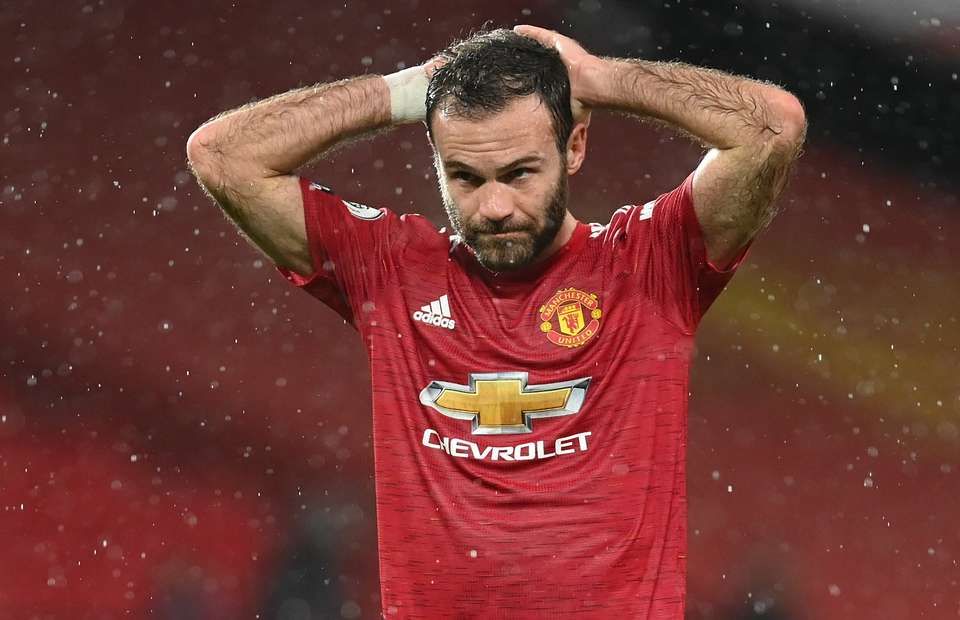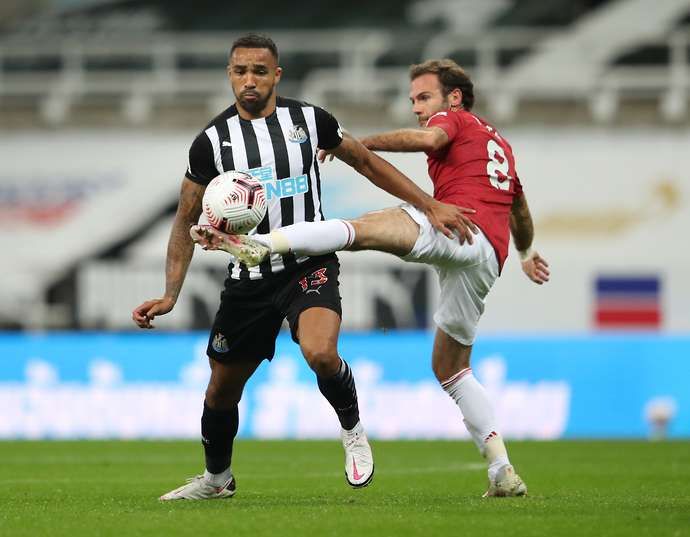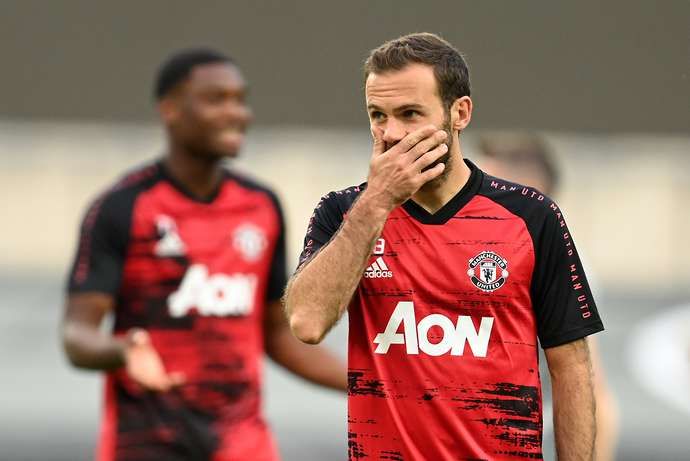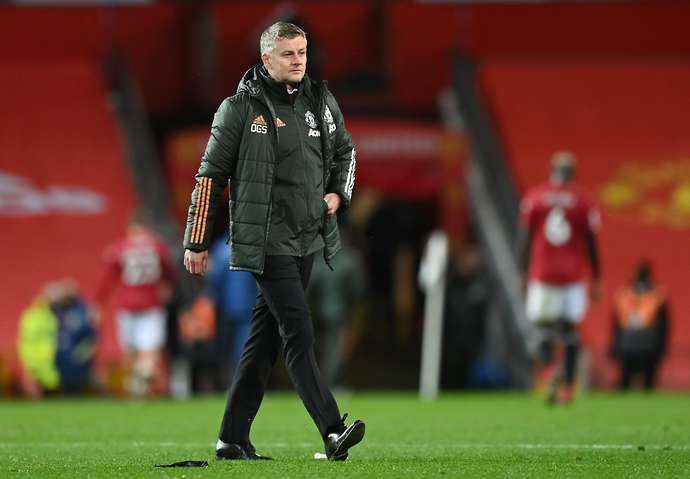Upon seeing his number light up on the substitutes board with just over half an hour left to play, there was a subtle shake of the head from Juan Mata as he trudged off the field against former club Chelsea.
During the first 58 minutes in which Manchester United had failed to score, he’d created their most promising chance by providing one of the game’s very few glimpses of true quality, slotting in Marcus Rashford with a perfectly weighted first-time pass.
Nonetheless, it was the Spaniard who found himself sacrificed, in a manner all too predictable.
Despite ranking only second to Bruno Fernandes for created chances since returning to Manchester United’s starting XI and helping inspire a drastic uplift in performance with a 4-1 win over Newcastle, Mata was once again being pushed to the peripheries in favour of a more illustrious name - in this instance, arguably the most illustrious of all at Old Trafford in Paul Pogba.
Whereas a prior midweek absence for a Champions League clash with PSG seemed a tacit guarantee that he would keep his place in Ole Gunnar Solskjaer’s Premier League side for Chelsea’s visit to Old Trafford, his omission for the 5-0 thumping of RB Leipzig last Wednesday put the writing on the wall; once again, through no obvious fault of his own, Mata was about to plummet down the pecking order.
Versus Arsenal this Sunday, the benched Spaniard wasn’t even brought on as United futilely searched for an equaliser in an eventual 1-0 defeat. Unable to circumvent Mikel Arteta’s incredibly well-organised side that expertly transitioned between 4-3-3 and 3-4-3, the game was crying out for the influence of a pass master of Mata’s pedigree.
As Nemanja Matic, Donny van de Beek and Edinson Cavani were given runouts instead, the overlooked 32-year-old would have been the most disappointed yet least surprised of anybody, because his recent United career has followed a recurring path; Mata’s one of the first players brought in when things aren’t going well, and one of the first to be dropped as soon as results improve.
Take the end of the 2018/19 season: Mata returned to the starting XI after a 2-0 defeat to Arsenal and helped secure a 2-1 win over Watford. He was then benched for the next game, which United lost against Wolves, only to be brought back in and provide an assist in a victory over West Ham. He was then benched again, United lost to Everton and Man City, and subsequently reinstated for draws with Chelsea and Huddersfield. After that, he was left out on the final day of the season as the Red Devils lost to Cardiff.
Last term saw a similar theme, albeit this time Mata serving more as a scapegoat than a saviour. The midfielder made his first Premier League start of the season after United lost 2-1 at home to Crystal Palace, staying in the side for a draw with Southampton and a win over Leicester. But as soon as United lost to West Ham, he was axed - not even brought on in the subsequent 1-1 draw with Arsenal. Upon his return, Solskjaer’s side lost to Newcastle, and Mata would then start just one of United’s next 13 top-flight clashes.
Injected back into the starting line-up following a 2-0 defeat to the Gunners, he notched up two assists against Norwich, only to be dropped for the following fixture against Liverpool. United lost 2-0 at Anfield, predictably leading to him being recalled for the following two Premier League outings. But the Red Devils failed to win either and thus Mata wouldn’t feature in Solskjaer’s top flight XI for the rest of the season.
It would take a 6-1 capitulation against Tottenham for Mata to make his first Premier League start in nine months and while that fact is inevitably made all the more hyperbolic by the postponement of English football, it equates to a run of 16 games - coming off the bench in just three of them, and left out of the squad entirely for two at the start of this season.
Mata’s United career has constantly looped around the same paradox of him being amongst the most proven players at Old Trafford, yet one that managers are always trying to find a way of evolving away from. He’s somehow both the saviour and the scapegoat; trusted to come in and help lift performances yet sacrificed as soon as United appear to have turned a corner. Somehow, no matter what the problem is at United, he’s always the solution in one way or the other - either he’s seen as exactly what the starting XI is lacking, or the luxury it could readily do without.
He’s as influential as he is expendable, and it seems the only way Mata can guarantee his starting XI status for any subsequent game is by producing a ten-out-of-ten performance. That is perhaps why the frustration was so visible on his face when he was hooked off against Chelsea; while his displays versus Newcastle and the Blues hadn’t quite reached those heights, he had been influencing games to a far greater degree than most of his midfield rivals have managed this season and surely done exactly what Solskjaer had asked of him.
As well as injecting added creativity into a side that painfully lacked it in their first three Premier League outings of the campaign, Mata demonstrated a unique understanding with United’s most important player, Bruno Fernandes. The two No.10s linked up repeatedly against Newcastle and their capacity to interchange positions lead to the one-time pass that Rashford failed to convert against Chelsea, with Mata sneaking into the central pocket that Fernandes had vacated by drifting to the right-hand side.
He offered Fernandes more freedom to roam around the attacking midfield berth and an outlet on a similar wavelength, while even defensively - despite that side of his game being a much-discussed natural weakness - Mata managed to keep Ben Chilwell pinned back and limit his attacking influence down Chelsea’s left-hand side.
All in all, during Mata’s time in the starting XI he made United a better functioning team. 148 minutes had seen four goals scored, one goal conceded and essentially four points gained; the rest of United’s Premier League campaign has equated to five goals scored, 12 conceded and three points gained in 392 minutes.
Of course, there are more factors at play than simply Mata’s presence in the starting XI, but it nonetheless begs the question of why he’s so readily dismissed by Solskjaer when United have fared so clearly worse in his absence.
Perhaps the simplest explanation is that Mata’s nobody’s man. Signed in a mid-season panic in 2014 for no reason other than his availability and United’s failure to bring in anyone of note during the transfer window prior, it’s hard to even count him as a David Moyes acquisition - the Scot had no immediate plan for how to integrate the former Chelsea Player of the Year into his starting XI and ultimately Mata’s arrival at Old Trafford was one gained more through reputation than genuine interest, let alone necessity.
The managerial obligation to play him ended when Moyes left Old Trafford just a few months later. United have gone on to employ three more full-time managers since then, while even the once-club-record transfer fee paid to sign Mata from Chelsea today pales in significance to the fortunes forked out on Fred and Pogba. Solskjaer’s got more pressing priorities when it comes to keeping players happy - like the most expensive signing in United’s history, who will enter the final twelve months of his contract next summer, and his own playmaking acquisition in van de Beek.
Likewise, no discussion of Mata would be complete without the age-old arguments of the declining trust in traditional No.10s. The Spaniard’s breed have significantly lessened in importance in recent years - just look at Mesut Ozil’s decline into the abyss at Arsenal - and those who have survived have been highly adaptable, possessing either the natural speed to play out wide or the discipline to set up deeper.
Mata, for all his qualities, is a limited player - he lacks athleticism and defensive awareness - and despite once presenting a very convincing case for being a more influential No.10 than David Silva during his Chelsea days, those limitations have continually narrowed down his categorisation to that of a luxury player, someone who can be the best player on the pitch when used in the right context, but not someone who can be relied upon week-in, week-out.
And yet, during a season in which Pogba has conceded more Premier League penalties than recorded goal involvements, van de Beek has failed to convince Solskjaer that he’s deserving of a Premier League start, and Anthony Martial and Mason Greenwood have fallen significantly short of last term’s steady supply of net ripples, the manner in which Mata’s positive influence has been so quickly forgotten about remains bemusing.
A fortnight prior he was an integral component of the only Premier League game this season in which United have produced flowing football throughout the ninety minutes. On Sunday, in a game where Solskjaer desperately needed guile and composure to weave through an entrenched Arsenal side holding onto a one-goal lead, he was disregarded as an unused substitute.
Nonetheless, this sadly isn’t new territory for Mata, and from the moment he was subbed off against Arsenal the expression on his face suggested he anticipated not kicking a ball at any point over United’s next two games.
Now the Red Devils have fallen short of another Big Six rival, he might well find himself back in the mix for coming clashes with Everton and West Brom, but deep down the Spaniard will know any starting XI reprieve will be only temporary.
At this stage of his United career, it has become almost pre-determined that Mata can only ever be a victim of his own positive influence, or the scapegoat when his involvement doesn’t provide the lift expected.
A cruel, cruel, recurring self-perpetuating fallacy for a World Cup winning playmaker who was once the Premier League’s best in class.


















